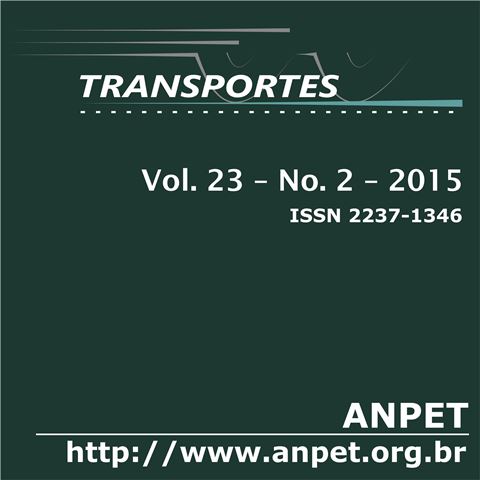.
DOI:
https://doi.org/10.14295/transportes.v23i2.773Keywords:
Eco-Driving, Fuel Saving, Energy Saving.Abstract
This article aims at presenting the results obtained through a project with the participation of 22 drivers and 11 heavy vehicles for the collection and transfer of waste in urban areas in the city of Rio de Janeiro. For this, a literature review was conducted to present the main concepts and objectives of the studied theme and then presented the data and information of the implemented project. It was identified that there is a potential in the use of Eco-driving in financial and environmental terms, applied to municipal waste collection vehicles. In the case study, through that this practice was obtained up to 7.6% in improved fuel economy and reduced to 7.1% in CO2 emissions (the main greenhouse gas) and local air pollutants.Downloads
References
change when following an eco-driving car? Procedia - Social and Behavioral Sciences, v.20, p. 577–587. doi:10.1016/j.sbspro.2011.08.064
Barkenbus, J. N. (2010): Eco-driving: An overlooked climate change initiative. Energy Policy, v. 38 n.2, p. 762–769. doi:10.1016/j.enpol.2009.10.021
Barth, M. e Boriboonsomsin, K (2009): Energy and emissions impacts of a freeway-based dynamic eco-driving system. Transportation Research Part D: Transport and Environment, v.14, n.6, p. 400–410. doi:10.1016/j.trd.2009.01.004
Barth, M. e Boriboonsomsin, K (2008): “Real-World CO2 Impacts of Traffic Congestion”. Transportation Research Registro 2058, 163-171.DOI: 10.3141/2058-20
Boriboonsomsin, K., VU, A. e Barth, M. (2010): Eco-Driving: Pilot Evaluation of Driving Behavior Changes Among U.S. Drivers. University of California Transportation Center.
COMLURB (2013). Banco de dados da Companhia Municipal de Limpeza Urbana do Município do Rio de Janeiro (COMLURB), Rio de Janeiro, RJ.
Fernandes, V.A.; Deveza, A. C. P.; Dagosto, M. A. (2013): Eco-driving: uma solução dentro da Logística Verde – aplicado a veículos de coleta de resíduos urbanos. XXVII Congresso de Ensino e Pesquisa em Transportes (ANPET)
IPCC (2007). Climate Change 2007: Synthesis Report. Disponível em: www.ipcc.ch/pdf/assessment-report/ar4/syr/ar4_syr.pdf
IPEA (2012). A Nova Lei de Diretrizes da Política Nacional de Mobilidade Urbana. Comunicados do IPEA. 06 de janeiro de 2012. Disponível em: http://www.ipea.gov.br
CNT/SEST/SENAT (2012) – CNT (2012) Caminhoneiro amigo do meio ambiente. Brasília, DF: CNT. Disponível em: http://www.cnt.org.br/riomais20/resources/cartilhas/Caminhoneiro_B.pdf.
COPPE e Rio Prefeitura (2011). Greenhouse Gas Inventory and Emissions Scenario of Rio de Janeiro, Brazil: Technical Summary. Disponível em: http://www.rio.rj.gov.br/web/smac/exibeconteudo?article- id=2351770
GTZ (2005). Sustainable Transport: A Sourcebook for policy-makers in developing cities. Module 4f, Ecodriving. Federal Ministry for Economic Cooperation and development, Germany.
MCT (2004). Ministério da Ciência e Tecnologia (Ministry of Science and Technology), 2004. Primeiro Inventário Brasileiro de Emissões Antrópicas de Gases de Efeito Estufa. Relatórios de referência para emissões e remoções de dióxido de carbono por conversão de florestas e abandono de terras cultivadas, Brasília.
MINISTÉRIO DO MEIO AMBIENTE (MMA) (2011). Primeiro inventário de emissões atmosféricas por veículos automotores rodoviários – relatório final. Jan. 2011. Disponível em: http://www.mma.gov.br/estruturas/163/_publicacao/163_publicacao27072011055200.pdf>.
MME (2012). Estudo associado ao plano decenal de energia – PDE 2021: consolidação de bases de dados do setor de transporte: 1970-2010. Nota técnica SDB-Abast No 1/2012. Empresa de Pesquisa Energética – Ministério de Minas e Energia – Brasil.
Novaes, A. G., Logística e gerenciamento da cadeia de distribuição, 2ª Ed, Rio de Janeiro, Elsevier, 2004.
Ogburn, M. L.; Ramroth, A. B. (2008). Transformational trucks: Determining the energy efficiency limits of a class-8 tractor trailer. Snowmass, CO: Rocky Mountain Institute.Publ.T08-08.
Oliveira, L. A., Dagosto, M. A., Fernandes, V. A e Oliveira, C. M. (2014). A financial and environmental evaluation for the introduction of diesel-hydraulic hybrid-drive system in urban waste collection. Transportation Research Part D, v. 3, pp. 100–109.
http://dx.doi.org/10.1016/j.trd.2014.05.021
Silva, W. B (2007). Aprendizagem: um estudo da contribuição da capacitação de motoristas de caminhão para a redução dos custos operacionais da frota. Dissertação (Mestrado) Pontifícia Universidade Católica de São Paulo.
Stevenson W. J. (1981) Estatística Aplicada à Administração. São Paulo: Editora Harbra Ltda.
Sivak, M; Schoettle, B (2012): Eco-driving: Strategic, tactical, and operational decisions of the driver that influence vehicle fuel economy. Transport Policy, v. 22, p. 96–99.
TRANSPORT RESEARCH BOARD (2010). Committee to Assess Fuel Economy Technologies for Medium-, and Heavy-Duty Vehicles. Technologies and Approaches to Reducing the Fuel Consumption of Medium-and Heavy-duty Vehicles. National Academy Press.
UNITED NATIONS (1998). Kyoto Protocol, Kyoto. Nations framework convention on climate change.
WORLD BANK (2011a). Brazil Green Freight Transport Report: World Bank NLTA: “Mainstreaming Green Trucks in Brazil”.
WORLD BANK (2011b). Guangzhou Green Trucks Pilot Project: Technology Pilot Report for the World Bank “Truck GHG Emission Reduction Pilot Project”.
Zarkadoula, M; ZoidiS, G; Tritopoulou, E (2007): Training urban bus drivers to promote smart driving: A note on a Greek eco-driving pilot program. Transportation Research Part D: Transport and Environment, v.12, n.6, p. 449–451. doi:10.1016/j.trd.2007.05.002
Downloads
Published
How to Cite
Issue
Section
License
Authors who submit papers for publication by TRANSPORTES agree to the following terms:
- The authors retain the copyright and grant Transportes the right of first publication of the manuscript, without any financial charge, and waive any other remuneration for its publication by ANPET.
- Upon publication by Transportes, the manuscript is automatically licensed under the Creative Commons License CC BY 4.0 license. This license permits the work to be shared with proper attribution to the authors and its original publication in this journal, and to be adapted for non-commercial purposes, provided appropriate credit is given and any derivative works are distributed under the same terms.
- Authors are authorized to enter into additional separate contracts for the non-exclusive distribution of the version of the manuscript published in this journal (e.g., publishing in an institutional repository or as a book chapter), with recognition of the initial publication in this journal, provided that such a contract does not imply an endorsement of the content of the manuscript or the new medium by ANPET.
- Authors are permitted and encouraged to publish and distribute their work online (e.g., in institutional repositories or on their personal websites) after the editorial process is complete. As Transportes provides open access to all published issues, authors are encouraged to use links to the DOI of their article in these cases.
- Authors guarantee that they have obtained the necessary authorization from their employers for the transfer of rights under this agreement, if these employers hold any copyright over the manuscript. Additionally, authors assume all responsibility for any copyright infringements by these employers, releasing ANPET and Transportes from any responsibility in this regard.
- Authors assume full responsibility for the content of the manuscript, including the necessary and appropriate authorizations for the disclosure of collected data and obtained results, releasing ANPET and Transportes from any responsibility in this regard.









